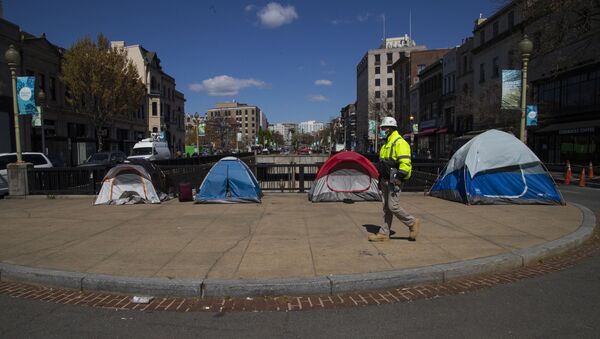On April 25 in cities across the US, people will be mobilizing to call for “a national cancellation of all rents, mortgages for homeowners, small landlords and small businesses, for the duration of the pandemic,” according to the movement’s website.
At least 30% of renters could not pay their rent on April 1 due to the economic crisis caused by the pandemic, the group notes, adding that since the coronavirus outbreak began in the US, the federal government has provided at least $5 trillion to big banks and large corporations. However, a fraction of that amount - only $249 billion - was allocated toward unemployment funding.
‘Let Us Send You a Few Crumbs’
“This massive gift to the banks - the 1% at the top, compared to the 160 million US workers - is 20 times the amount allotted for the unemployed. The money is there, it is simply a question of whether it is used to bail out Wall Street or to protect the homes of poor and working people. This wealth and the vast number of vacant housing units can be used to provide shelter for the homeless as well,” the movement’s website explains.
“I think a lot of people are choosing to eat rather than pay their rent. But, you know, I mean this so-called bailout … this is a fiscal stimulus package, but it’s a redistribution of money from the people to the banks and corporations. It’s like, let us send you a few crumbs that you can then send back to all the entities that you owe money to. It doesn’t go anywhere near far enough,” Mrabet told hosts Bob Schlehuber and Jamarl Thomas.
“I mean, we really are facing a crisis here. It’s kind of like a fork in the road, you know? Either things just continue to get worse, and we’ll see massive evictions … We’ve already seen people get pushed out, and we’ve seen a parking lot where they’ve got little beds set up for people 6 feet apart. We’ve seen some ridiculous things," Mrabet noted.
“What we haven’t seen is all of the vacant units in a city like DC, where there are thousands of vacant units that we could easily use to house people that need housing - we have not seen that happen. We have seen, you know, little action and little empathy from our so-called political leaders who have really just continued to collaborate with developers,” she said.
The DC Supreme Court in March announced that it was suspending evictions of all tenants and foreclosed homeowners until May 15. However, many people will likely not be protected from evictions after the COVID-19 crisis begins to fade out.
A relief bill passed by the DC City Council in early April provided deferments for mortgage payments - that is, landlords - but only promised DC renters their rents would not increase during the crisis. Washington, DC, has the third-highest average rent in the country, according to an October 2019 study, ranking in at a whopping $3,100 per month.
“Unfortunately the solution that [DC Mayor Muriel] Bowser has sought is essentially the privatization of the last remnants of affordable housing stock in DC, which is public housing, which of course has long been neglected by the city and has been allowed to in most cases turn into slums. What they have done is adopted a housing policy that is being dictated by the profit motives of the developers that are developing in this city, which is why it is the most intensely gentrifying city in the country, with the highest rate of homelessness per capita and the highest rate of incarceration per capita,” Mrabet said.
“The issue of mass incarceration is directly tied to the housing crisis as well, because as developers move forward with their plans, it requires removing the existing working-class residents from their communities, and a part of that process involves utilizing the police and instituting new community rules and things like that in order for the process of gentrification to take place,” she added.

